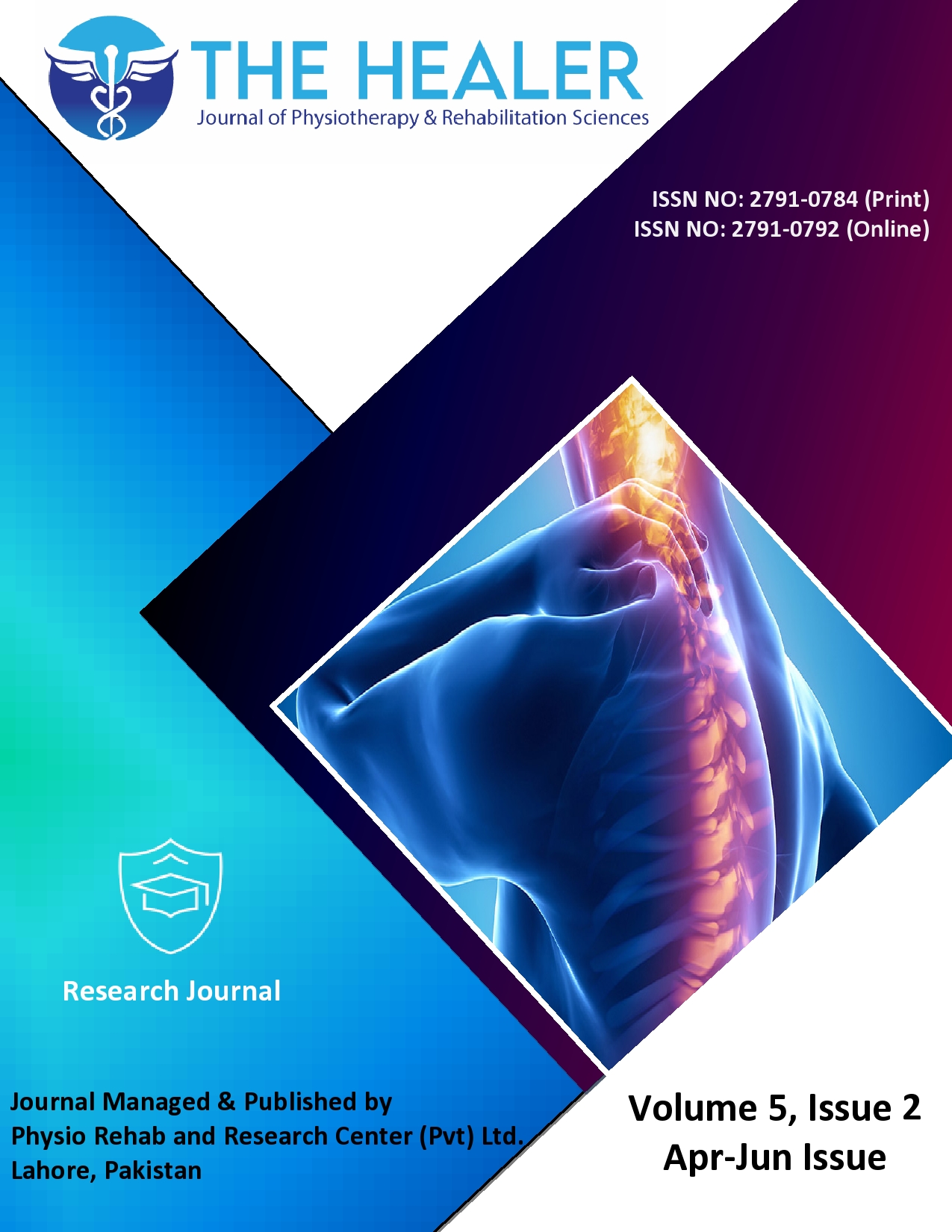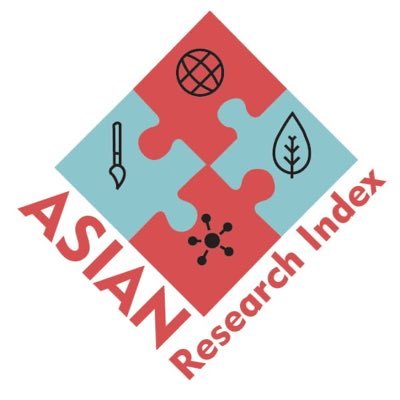Epidemiological Insights into Work-Related Low Back Pain Among Industrial Laborers of Khyber Pakhtunkhwa Pakistan
DOI:
https://doi.org/10.55735/21zhny10Keywords:
Ergonomics , Epidemiology , Industrial workers , Low back pain , Occupational health , Risk factorsAbstract
Background: Low back pain is among the most common occupational health problems worldwide, yet its burden among industrial laborers in Khyber Pakhtunkhwa, Pakistan, remains underexplored. Objective: To explore epidemiological insights into work-related low back pain among industrial laborers of Khyber Pakhtunkhwa, Pakistan. Methodology: A descriptive cross-sectional study was conducted for a 1-year of time period from May 2024 to May 2025 among 330 male industrial laborers from three industries in Gadoon Industrial Estate, Swabi, Khyber Pakhtunkhwa. Participants were recruited using convenience sampling, and data were collected using a Nordic Musculoskeletal Questionnaire. Workers who had a previous history of spinal trauma or surgery, or any congenital deformities of the spine, systemic musculoskeletal or neurological diseases such as rheumatoid arthritis, ankylosing spondylitis, or multiple sclerosis were excluded from the study. Descriptive analysis was performed using SPSS version 27 to calculate prevalence, frequencies, and percentages were calculated. Results: The prevalence of low back pain was 233(70.6%). The most affected age group was 40-55 years (97.4%), followed by 25-40 years (80.1%). Longer work duration was strongly associated with low back pain; workers with 15-20 years of experience reported a 100% prevalence. Daily working hours also influenced outcomes, with the highest prevalence among those working ≥12 hours (81.8%). Standing was the most frequently reported position contributing to pain (38.8%), followed by sitting (34.8%). Low back pain significantly interfered with personal care (41.6%), travelling (59.2%), sitting/standing (74.2%), and lifting objects (74.2%). Most affected workers reported mild (46.4%) or moderate (37.3%) pain, while 15.5% experienced severe pain. Conclusion: Low back pain is highly prevalent among industrial workers in Khyber Pakhtunkhwa, particularly among older workers, those with longer work histories, and extended hours. Standing posture and prolonged sitting are key occupational risk factors.
Downloads
References
1. Southerst D, Hincapié CA, Yu H, et al. Systematic review to inform World Health Organization (WHO) clinical practice guideline: benefits and harms of structured and standardized education or advice for chronic primary low back pain in adults. Journal of Occupational Rehabilitation 2023; 33(4): 625-35. DOI: https://doi.org/10.1007/s10926-023-10124-4
https://doi.org/10.1007/s10926-023-10120-8 DOI: https://doi.org/10.1007/s10926-023-10120-8
2. Ferreira ML, Luca K de, Haile LM. Global, regional, and national burden of low back pain, 1990-2020, its attributable risk factors, and projections to 2050: a systematic analysis of the Global Burden of Disease Study 2021. The Lancet Rheumatology 2021; 5(6): e316-e329.
https://doi.org/10.1016/S2665-9913(23)00098-X. DOI: https://doi.org/10.1016/S2665-9913(23)00098-X
3. Chen S, Chen M, Wu X, et al. Global, regional, and national burden of low back pain 1990-2019: A systematic analysis of the Global Burden of Disease study 2019. Journal of Orthopaedic Translation 2022; 32: 49-58. DOI: https://doi.org/10.1016/j.jot.2021.07.005
https://doi.org/10.1016/j.jot.2021.07.005 DOI: https://doi.org/10.1016/j.jot.2021.07.005
4. Atalay YA, Gebeyehu NA, Gelaw KA. The prevalence of occupational-related low back pain among working populations in Sub-Saharan Africa: a systematic review and meta-analysis. Journal of Occupational Medicine and Toxicology 2024; 19(1): 39. DOI: https://doi.org/10.1186/s12995-024-00438-1
https://doi.org/10.1186/s12995-024-00438-1 DOI: https://doi.org/10.1186/s12995-024-00438-1
5. Chowdhury MOSA, Huda N, Alam MM, et al. Work-related risk factors and the prevalence of low back pain among low-income industrial workers in Bangladesh: results from a cross-sectional study. Bulletin of Faculty of Physical Therapy 2023; 28(1): 20. DOI: https://doi.org/10.1186/s43161-023-00132-z
https://doi.org/10.1186/s43161-023-00132-z DOI: https://doi.org/10.1186/s43161-023-00132-z
6. Al-Salameen AH, Abugad HA, Al-Otaibi ST. Low back pain among workers in a paint factory. Saudi Journal of Medicine & Medical Sciences 2019; 7(1): 33-39. DOI: https://doi.org/10.4103/sjmms.sjmms_81_17
https://doi.org/10.4103/sjmms.sjmms_81_17 DOI: https://doi.org/10.4103/sjmms.sjmms_81_17
7. Xu G, Pang D, Liu F, Pei D, Wang S, Li L. Prevalence of low back pain and associated occupational factors among Chinese coal miners. BMC Public Health 2012; 12(1): 149. DOI: https://doi.org/10.1186/PREACCEPT-2029232423583042
https://doi.org/10.1186/1471-2458-12-149 DOI: https://doi.org/10.1186/1471-2458-12-149
8. Ahmad S, Aamir S, Gul F, Wahid E, Khan MS, Khan A. Work-related musculoskeletal disorders among tailors in Saddar, Peshawar: a cross-sectional study. Journal of Modern Health and Rehabilitation Sciences 2025; 2(2): 104
9. Ijaz M, Akram M, Ahmad SR, Mirza K, Ali Nadeem F, Thygerson SM. Risk factors associated with the prevalence of upper and lower back pain in male underground coal miners in Punjab, Pakistan. International Journal of Environmental Research and Public Health 2020; 17(11): 4102. DOI: https://doi.org/10.3390/ijerph17114102
https://doi.org/10.3390/ijerph17114102 DOI: https://doi.org/10.3390/ijerph17114102
10. Zhang C, Lv B, Yi Q, Qiu G, Wu F. Global, regional, and national burden of low back pain in working-age population from 1990 to 2021 and projections for 2050. Frontiers in Public Health 2025; 13: 1559355. DOI: https://doi.org/10.3389/fpubh.2025.1559355
https://doi.org/10.3389/fpubh.2025.1559355 DOI: https://doi.org/10.3389/fpubh.2025.1559355
11. Kashif M, Albalwi A, Raqib A, et al. Work-related musculoskeletal disorders among Pakistani construction workers: Prevalence, characteristics, and associated risk factors. Work 2022; 72(1): 119-26. DOI: https://doi.org/10.3233/WOR-205009
https://doi.org/10.3233/WOR-205009 DOI: https://doi.org/10.3233/WOR-205009
12. Bilal H, Bibi A, Farooqi S, Khan I, Khan QF, Khattak HG. Prevalence of low back pain and evaluation of work posture among healthcare professionals of district headquarter hospitals of Hazara division: a cross-sectional study. Rehman Journal of Health Sciences 2023; 5(2): 111-8.
https://doi.org/10.52442/rjhs.v5i2.388
13. Rafique N, Farooq W, Umer Z, et al. Prevalence, Risk factors, and effects of low back pain on quality of life among healthcare professionals of lahore, pakistan: effects of low back pain on quality of life. Pakistan Journal of Health Sciences 2023; 4(11): 60-5. DOI: https://doi.org/10.54393/pjhs.v4i11.1133
https://doi.org/10.54393/pjhs.v4i11.1133 DOI: https://doi.org/10.54393/pjhs.v4i11.1133
14. Afridi BM, Sikander MS, Khan H, Ahmad I. Prevalence of non-specific low back pain among the long route bus drivers in Peshawar, Khyber Pakhtunkhwa, Pakistan. Rehabilitation Communications 2023; 2(1): 05-11. DOI: https://doi.org/10.55627/rehab.002.01.0214
https://doi.org/10.55627/rehab.002.01.0214 DOI: https://doi.org/10.55627/rehab.002.01.0214
15. Tomita S, Arphorn S, Muto T, Koetkhlai K, Naing SS, Chaikittiporn C. Prevalence and risk factors of low back pain among Thai and Myanmar migrant seafood processing factory workers in Samut Sakorn Province, Thailand. Industrial Health 2010; 48(3): 283-91. DOI: https://doi.org/10.2486/indhealth.48.283
https://doi.org/10.2486/indhealth.48.283 DOI: https://doi.org/10.2486/indhealth.48.283
16. Shetty GM, Jain S, Thakur H, Khanna K. Prevalence of low back pain in India: A systematic review and meta-analysis. Work 2022; 73(2): 429-52. DOI: https://doi.org/10.3233/WOR-205300
https://doi.org/10.3233/WOR-205300 DOI: https://doi.org/10.3233/WOR-205300
17. Alaca N, Safran EE, Karamanlargil Aİ, Timucin E. Translation and cross-cultural adaptation of the extended version of the Nordic musculoskeletal questionnaire into Turkish. Journal of Musculoskeletal & Neuronal Interactions 2019; 19(4): 472.

Downloads
Published
License
Copyright (c) 2025 The Healer Journal of Physiotherapy and Rehabilitation Sciences

This work is licensed under a Creative Commons Attribution 4.0 International License.














